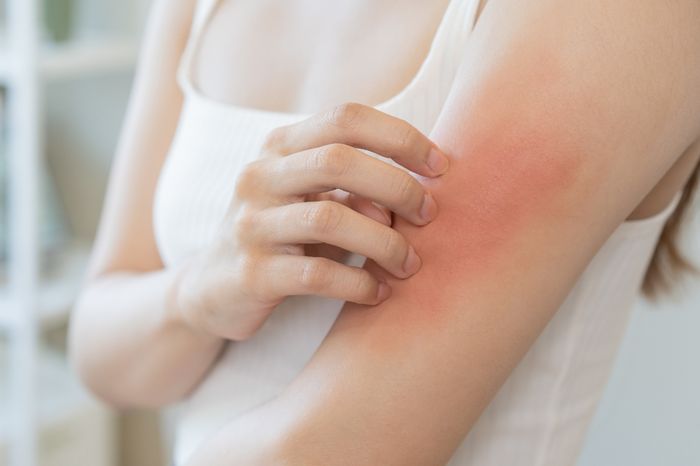Allergic Reactions: 4 At-Home Products and Methods to Combat the Itch
There is nothing worse than an intense itch, especially if it is caused by a sensitivity or allergic reaction. Even after removing the allergen, the itch can remain and it is often unremitting. Alternative products like CBD and colloidal oatmeal may help to calm the itch and make it possible for the reaction to die away. A mix of topical and systemic approaches tend to work the best overall.
Updated April 14, 2023.

Around 20% of the global population experience skin allergies at some point in their lives, while up to 78% have hay fever and itchy eyes, two of the most common symptoms of an allergic reaction (1). Scratching can exacerbate the problem and lead to broken skin and even infection and scarring, which is why treating the symptoms as soon as possible to negate the itching is essential.
That being said, read on to discover what an allergic reaction really is and 5 ways that you can combat the symptoms.
What Is an Allergic Reaction?
An allergic reaction is a sensitivity to a particular substance (the allergen) that can occur when the person comes into contact with it, either by touch, ingestion, or even inhalation. If you are sensitive to something, your immune system will kick into action after contact and release histamines and other inflammatory substances. The reaction occurs because the body mistakes a harmless substance for a dangerous invader.
Symptoms of an Allergic Reaction
- Sneezing
- Itching
- Runny nose
- Rashes
- Problems with breathing
Some reactions can be so severe that they can lead to throat restriction, difficulty breathing, and intense hives (anaphylaxis) and require emergency treatment. Other allergies can be chronic and need an official medical diagnosis and specific treatment plan. However, there are many at-home remedies that will help you find relief from the symptoms and mild and persistent outbreaks.
1. Topical Ointments and Lotions
Most ointments for itching include moisturizing cream of some kind, though there are also many that are infused with natural therapeutic components.
Research suggests that CBD may help to alleviate itching in contact dermatitis (a common allergic reaction) because of its anti-inflammatory properties. As a topical treatment in a cream or oil, the application may soothe the itch (2).
Additionally, functional mushrooms are growing in popularity as an additional way to relieve symptoms of inflammatory conditions, including those that trigger skin conditions.
» Learn more: Treating Inflammatory Psoriasis With CBD and Functional Mushrooms
Maximum relief should be had by applying the topical remedy to the inflamed area as soon as an itch appears and then re-applying regularly until the reaction has diminished.
» Read to relieve your itch? See our Soothe Skin Balm and Deep Hydrate Cream
2. Antihistamine Medication
Antihistamine medication is one of the most recommended treatments for relieving itching caused by allergies. One of the main reactions the body has to allergens is to release histamine, which aggravates inflammation and leads to itching.
Additionally, antihistamine medication can help with sleep problems caused by persistent itching. Some strengths of over-the-counter antihistamine medication can offer fast relief and a decrease in symptoms all over the body.
3. Cool Baths With Colloidal Oatmeal
A somewhat old-fashioned method of relieving an itch that has been used for centuries is taking a cool bath with colloidal oatmeal, as it binds to your skin to create a protective barrier while also decreasing inflammation (3).
You can purchase colloidal oatmeal ready prepared as well as in lotions, soaps, and shampoos (for itchy scalp), but you can also make your own. The method that seems to work the best is the simplest: pure colloidal oatmeal added to your bath.
4. Ice Packs
Another easy method of decreasing the itch of an allergic reaction is to lower the temperature of a local area using ice packs. Coldness can reduce swelling and inflammation by inducing a numbing sensation and restricting blood flow to the area.
You can easily make your own ice packs at home to reduce costs if you suffer from allergies regularly. It is important to ensure that they are only left on for 10-15 minutes and that the temperature is controlled. If ice touches your skin directly, it can lead to burns and other problems.
Bonus Tip: Prevention Is Better Than Treatment
The best method for managing allergic reactions is to prevent them in the first place. Identifying allergens and triggers will allow you better avoid them. As such, consulting your doctor and getting tested for all your potential allergies is essential if you find yourself constantly dealing with the aforementioned symptoms.
» Read to relieve your itch? See our Soothe Skin Balm and Deep Hydrate Cream
What Are You Waiting For?
There are a variety of ways to treat the itch that comes from an allergic reaction. Some methods work better than others depending on the allergen, which is why it's important to have a few methods and products in mind if you deal with allergies regularly. If you're worried about side effects, chat with your doctor before adding any supplements to your regimen.
» Soothe your skin: Our solutions to skin problems







